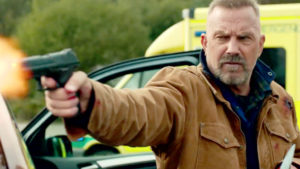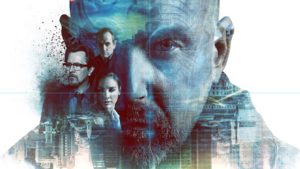Kevin Costner headed to the dark side with his latest character in the thriller, Criminal. We caught up with the superstar to talk about how he wrapped his head around the remorseless killer Jericho, sharing his Oscar-winning directing insight with Criminal helmer Ariel Vromen (and how that helped the film immensely as we stated in our Criminal review), as well as him sharing his insight into his vast career and how he feels, he is far from done. Hint: He will direct again… and it’s a western!
In Criminal, Costner plays a death row inmate who has the memories of a CIA operative (Ryan Reynolds) inserted into his brain. There is an international incident about to happen which could cripple the world as we know it and Jericho now holds the key to whether there is peace or all-out destruction.
Without further ado… here is our chat from the roundtable press day for Criminal:
Q: How much of this character did you have inside your head, and how much was informed once you got to set?
Kevin Costner: Honestly, this was the first role where I flew in the plane over and I didn’t have any idea how I was going to play this guy. I just didn’t. I didn’t know his voice was going to be. I knew he was in prison, so I grew my hair long and my beard long. The first day I got there, there was no rehearsal, and they said, “You’re going to rape Gal.” and I went, “I better cut my hair.” Literally went in and created the look by myself. I started to cut it and thought we should treat it like they were real butch with him and they didn’t care. They left him like a hamburger patty and they didn’t care. Let’s make the scar really severe. I had no director or producer in there, but I asked where the holes were going to be and they told me and probably in about an hour and a half I came out with that look. That’s a little scary because now you have to live with that. It was a weird thing. It was a severe look. What needed to be severe was the pain levels, the holes. That was very, very important to me. I got the look, but still didn’t have the voice. So, I went back to the script again, because we didn’t have rehearsal – which I don’t like – I went back to that first scene where I knew I would be choking on that thing in that prison… I thought to myself, I bet that affected my voice. I didn’t know on the plane, going through customs, I didn’t know in the car or shaking Gal’s hand… until I came out of that trailer – all of a sudden (snaps fingers), I had it. There’s a lesson in that, which isn’t a good one, which is that you can do that every time. You can’t. We always take the worst lessons from things, instead of just figuring we got away with something. Do not be afraid of filming this (pointing to the back of his head), because I’m going to be playing this pain the entire movie. You have to play that. This is a big concept anyway, so you have to play that. I will play the level of confusion and pain and you have to let me do that in every scene.
Q: Ariel said he credits you, in the editing room for Criminal, for bringing back the humor because he went dark…
Kevin Costner: I think nothing ever suffers from a sense of humor and by the way, it heightens the violence. As soon as he punches the guy, he realizes he wants to get more sugar. So, he’s a little bit childish. Those are things that I try to bring.
Q: Did you have any pause about playing such a bad guy?
Kevin Costner: I didn’t have trepidation, but it was how I was going to do that. When I fight those four guys in the van, I have to find a way to do that myself. That’s one of the best action fight scenes I’ve ever been a part of. I had to help create that. We see Arnold Schwarzenegger beat up everybody in the room. We see Denzel beat up everybody in Book of Eli, everybody in the room. We’ve seen Stallone do that… I don’t think that I can do that. I have to have a level of creativity that goes with my violence. I worked out that I hit the one guy on the back side – one guy comes around this way and I go around the other way, and the other guy is trying to get out of the car and I hurt his leg and drops his lunch pail. Then this guy comes back around and I hit him with the lunch pail. I like violence to not be so smooth. How could he defeat these guys, who are rugby hooligans themselves? Number one, he has prison experience… but it’s in the way he moves.
Q: One of the great moments in the film is when Jericho bonds with the little girl, Emma, played by Lara Decaro. How important was it to you to have those touchstones of humanity for Jericho?
Kevin Costner: I liked that about the script. You understand, he’s just having these little feelings like he knows he can’t hurt this little girl. Maybe before he had his head operated on, he wouldn’t treat that little girl the same way. You know, some child actors come off cute but they are not necessarily good actors. Lara was a good actress and cute. So there was something real about her.”
Q: You’ve played morally compromised characters before, so this wasn’t a complete stretch.
Kevin Costner: I have. I think you play these people as if other people don’t understand your problems. They think you’re a bad guy but you say, well you don’t understand. I have my own problems. You think I’m bad, but I don’t think I’m bad.
Q: How does it make you feel when someone comes up to you and recites one of your movies to you?
Kevin Costner: I just try to be relevant to myself, and sometimes I don’t feel relevant. But in talking about overall career in general, I think what’s most pleasing to me is that when someone comes up to me, I don’t know what film is going to come out of their mouths. And I think to myself, I would hate it if there was a single movie that people zeroed in on. People will talk about The War, they’ll talk about Fandango. Of course, they are going to say Bodyguard or Field of Dreams or Dances with Wolves or Open Range. I don’t know what they are going to say, and that’s been really pleasing to me.
Q: Do you feel like you still have more to do?
Kevin Costner: I do. I feel like I want to direct more. I have a Western that I want to do that is very heavy on women — very hard on women. But so beautifully written that you might go, ‘I wonder if I would have made it.’ And that’s a very cool place to be, watching a movie in the dark about the formation of our country in which one wrong turn means death. That movie, it’s a writing piece but it’s got all the stuff. I desperately want to start it in May. I know if I make it and you watch it, you’ll see yourself in it and not because they are prostitutes. You’ll see just how easy it is to be compromised. I know my great grandmother was worked to death by my great grandfather. He just worked her death. She died at 43 after giving him 13 kids, in Oklahoma. Women in the West, they were worked to death. It wasn’t easy for them. I try to make parts where good actors want to come to them and women want to be them.



